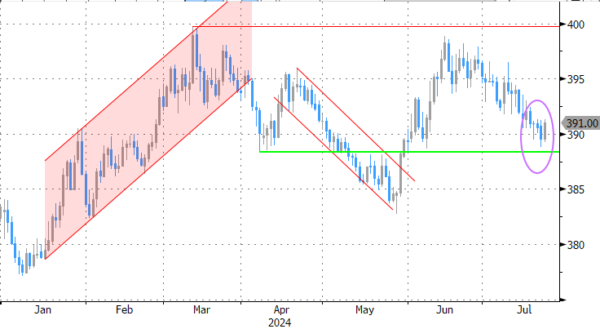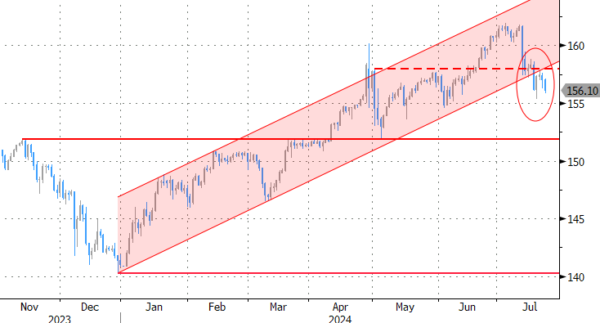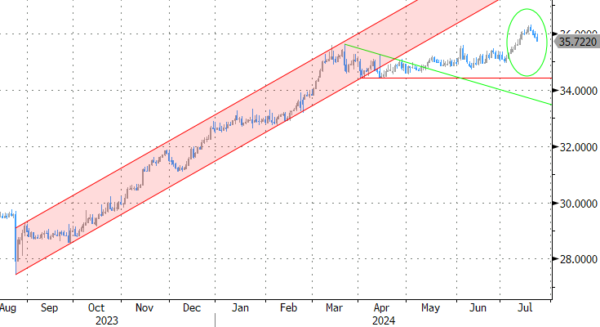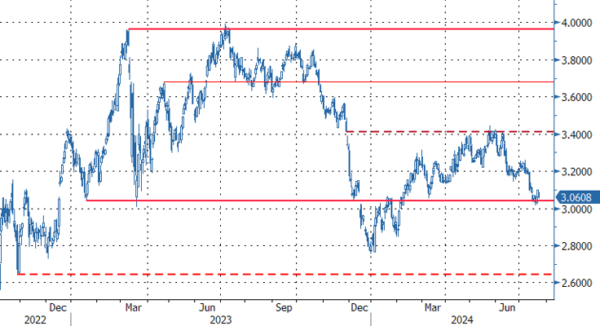Markets
Another empty daily calendar left investors to their own devices with central bank meetings in Hungary (-25 bps to 6.75%, as expected) and Turkey (unchanged at 50%, cfr. infra) offering some distraction in non-core areas. That resulted in core bonds gaining ground after three days of losses. German Bunds outperformed US Treasuries this time around. Excluding the 2-yr yield (-10 bps due to a benchmark change), yields decline between 4 and 5.5 bps. ECB’s de Guindos was the latest to chip in after last week’s (uninspiring) policy meeting. The vice-president said the huge level of uncertainty warrants prudence when setting rates. He referred to the September meeting, which produces new forecast, as a “much more convenient month for taking decisions”. He noted that “All measures of underlying inflation are coming down” and that wages are slowing down as well. This will show up in services inflation (4.1% in June) eventually. US yield moves varied between -1.5 and -1.9 bps in technically insignificant trading. Stocks in Europe still eke out a gain to the tune of 0.4% but are off intraday highs. Wall Street opened little changed, awaiting the earnings release of tech bellwethers including Google parent Alphabet and Tesla as well as consumer discretionary giant LVMH after market.
The Japanese yen for a second day straight takes the lead on currency markets. USD/JPY is on track for the lowest close around 156.1 since early June. EUR/JPY slipped through the 170 barrier and in doing so is testing the lower bound of the 2024 upward trading channel. The Norwegian krone lags G10 peers with oil prices extending the July correction to $81.65 (Brent) currently. The euro is weighed down by falling European/German yields. EUR/USD drops to 1.0854 from an open just south of 1.09. Sterling erases much of the losses incurred last week to trade around the levels seen just before the higher-than-expected CPI release. EUR/GBP is filling offers at 0.84.
News & Views
Vice governor Jan Fait of the Czech National Bank (CNB) in an interview indicated that the focus at the August 1 policy meeting will be on a 25 bps rate cut as the CNB is approaching the point of finetuning its policy. Even so, he didn’t also didn’t completely rule out another 50 bps step as inflation in June was again softer than expected (-0.3% M/M and 2.0% Y/Y). Frait sees room for the CNB to cut rates from 4.75% now to around 4.0% ‘give or take 25 bps’ at the end of the year. With respect to the economy, he indicated that household consumption, investment activity and demand for Czech exports are rather weak and not generating substantial demand-led inflationary pressures. A tight labour market is a good reason to proceed cautiously with monetary policy easing. He assess the koruna currently a bit weaker than fundaments imply. This is not a reason to be afraid to at least consider a 50 bps cut next week. With respect to the neutral rate, also Jan Frait sees this as probably being a bit higher than the 3.0% level currently used in the CNB model. The koruna today weakened further to EUR/CCZK 25.38 from 25.25 and is nearing the weakest levels YTD against the euro (25.52 mid-February).
The Central Bank of Turkey (CBRT) as expected kept its policy rate on hold at 50% for the fourth consecutive meeting. The CBRT welcomes the decline in the underlying trend of monthly inflation in June (headline 1.64% M/M and 71.60% Y/Y from 3.37% M/M and 75.45% in May). The CBRT expects a temporary uptick in July due to external factors (administered prices, taxes, food prices), but sees the underlying inflation to stay relatively limited. Domestic demand is slowing down but still at inflationary levels. In this respect, the MPC remains highly attentive to inflationary risks. The tight monetary stance will be maintained until a significant and sustained decline in the underlying trend of monthly inflation is observed, and inflation expectations converge to the projected forecast range. A tight monetary stance is expected to bring down the underlying trend of monthly inflation through moderation in domestic demand, a real appreciation in Turkish lira and improving inflation expectations. The CBRT adds that the monetary transmission mechanism will continue to be supported via additional macroprudential measures, while sterilization will be implemented effectively by enriching the toolset whenever needed. The lira extends recent tentative gains trading near EUR/TRY 35.74.
Graphs
EUR/HUF: forint ends appreciation streak after central bank banks on slower-than-expected inflation by cutting rates to 6.75%

USD/JPY on track for lowest close since early June. JPY against EUR is testing lower bound of upward trading range.

EUR/TRY: “decisive” monetary policy stance, including an unchanged 50% policy rate, is not bringing the lira much support

European 2-yr swap yield struggles near recent lows, trying to keep the 3% clean










